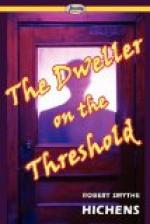“Professor,” he said at last, “I suppose your passion for facts has led men to put a great deal of faith in you. Hasn’t it?”
“I dare say my word carries some weight. I really don’t know,” responded Stepton, with an odd hint of something like modesty.
“I had thought of Malling first,” almost murmured Chichester.
“What’s that about Malling?”
“I think he would have accepted what I have to give more readily than you would. There seems to me something in him which stretches out arms toward those things in which mystics believe. In you there seems to me something which would almost rather repel such things.”
“I beg your pardon. I am quiescent. I neither seek to summon nor to repel.”
“I couldn’t tell Malling,” said Chichester. “His readiness stopped me. It struck me like a blow.”
“Malling prides himself on being severely neutral in mind.”
“And you on being skeptical?”
“I await facts.”
“Shall I give you some strange facts, the strangest perhaps you have ever met with?”
Stepton smiled dryly.
“You’ll forgive me, but some such remark has been the prelude to so many figments.”
“Figments?”
“Of the imagination.”
An expression of anger—almost like a noble anger it seemed—transformed Chichester’s face. It was as a fine wrath which looked down from a height, and in an instant it melted into pity.
“How much you must have missed because of your skepticism!” he said. “But I shall not let it affect me. You are a man of note-book and pencil. Will you promise me one thing? Will you give me your word not to share what I shall tell you with any one, unless, later on, I am willing that you should?”
“Oh, dear, yes!” said the professor.
And again he smiled. For even now he believed the curate to be wavering, swayed by conflicting emotions, and felt sure that a flick of the whip to his egoism would be likely to hasten the coming of what he, the professor, wanted.
A loud call rose up from the street. A wandering vender of something was crying his ware. In his voice was a sound of fierce melancholy. Chichester went to the window and shut it down.
“I wish it was night,” he said as he turned.
The professor jerked out his watch.
“It must be getting late,” he observed. “Past six! by Jove!”
He made an abrupt movement.
“What?” said Chichester. “You are going!”
He came up to the table.
“Sometimes I think,” he said, “that men hate and dread nothing as they hate and dread facts which may upset the theories they cherish.”
“You’re perfectly right. Well, very glad to have seen you in your own room.” The professor got up. “By their rooms shall ye know them.” He glanced round.
“Ah, I see you have Rossetti’s delightfully anemic Madonna, and Holman Hunt’s ‘Light of the World.’ A day or two ago I was talking to a lady who pronounced that—” he extended his finger toward the Hunt—“the greatest work of art produced in the last hundred years. Her reason? Its comforting quality. I am sure you agree with her. Good-by.”




